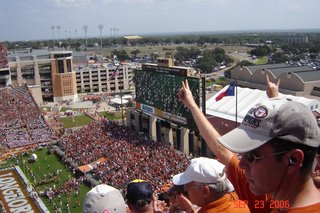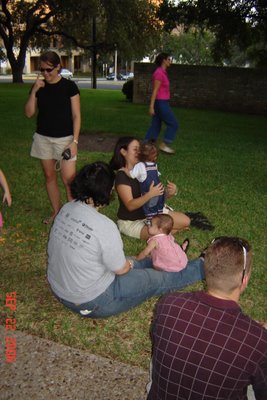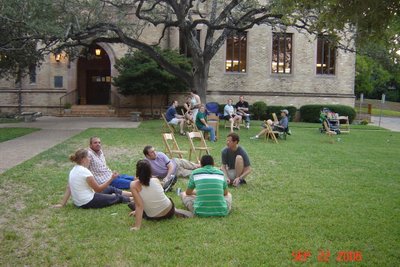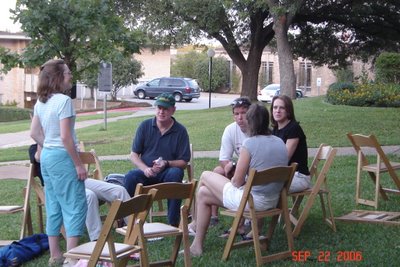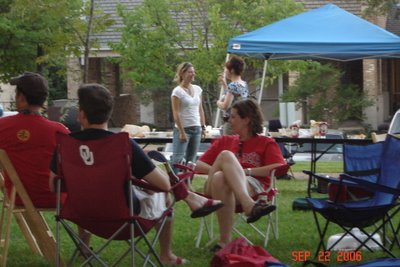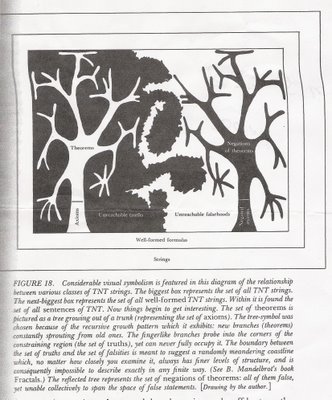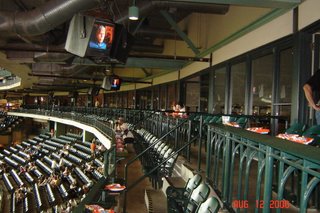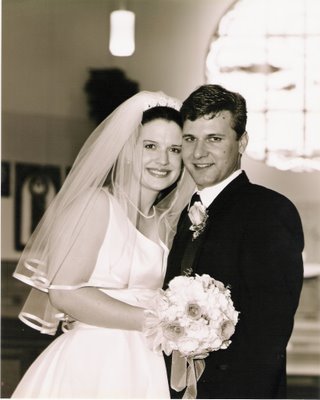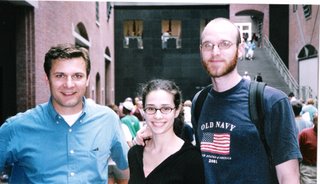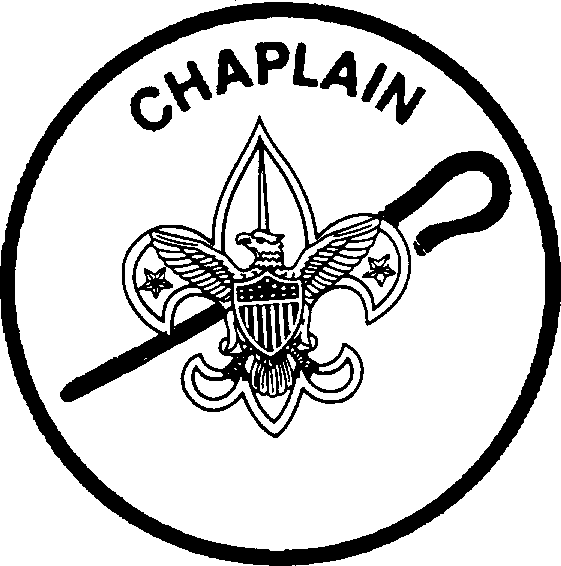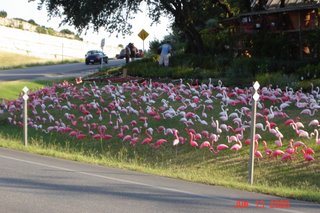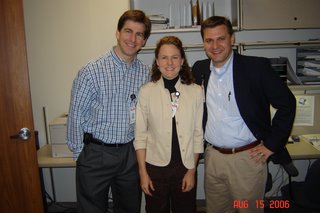
What does a final self evaluation look like:
1. List your learning goals. Give one example for each goal of how you purposefully attempted to address the goal. What new insights, if any, do you have about ministry and about yourself with respect to your goals?
a) To practice pastoral skills in a clinical setting
by interacting with patients and family:
I performed daily pastoral visits with patients on my assigned floor and followed patients (or their families), during times of crisis, healing, uncertainty, stress, and transfer to other facilities or discharge home. Sometimes I liked the routine, but sometimes it began to wear on me.
by providing spiritual guidance and support:
I practiced being a non-anxious presence: relying on prayer, relying on reformed theology in the light of ecumenical practice, by identifying my own emotional responses and those of the patient, and by helping individuals call on support systems that they already had in place or by referring them to other avenues for support (i.e. social workers, family, or church).
by practicing listening skills:
I tried to keep in mind those listening skills that strengthen trust and communication. I also tried to remain aware of the daily distractions to active listening—and name these for what they are, whenever possible. I found some people easier to listen to than others—and some conversations carried more of an impact on me, especially speaking with the parents of patients. Perhaps this has something to do with my history and knowing how hard those conversations can be.
by being familiar with available referral sites:
I tried to remain aware of individuals that had been identified as “hospice” or “palliative care” patients. I made special efforts to speak with these people and their families on a regular basis. The social worker kept me informed of situations on the floor that were unusual, and I asked questions about these situations, where appropriate. Something I wish I had done this summer is visiting some of the hospice locations many people from my floor transferred to.
b) To develop a process of self evaluation
by utilizing group feedback:
I have found group feedback to be helpful in identifying personal style, in identifying other working theologies, and essential to processing thoughts and feelings from stressful situations. In terms of self evaluation, I have found myself focusing more on my feelings in order to self access my ability to fully engage in pastoral ministry. The group helped me to identify relevant feelings or concerns in a more timely manner. By utilizing group feedback, I have felt more equipped to process and deal with my own feelings as well as the feelings of those I have observed in the hospital and in the CPE group. I have also become acutely aware of my need for “self care”. I know that I am not effective when I am worn down—and that it is during those times when my energy level is at its lowest that I am most susceptible to illness or stress.
by responding to direct supervision:
I have found the supervision process to be rewarding and informative. During supervision I have especially enjoyed learning of different techniques and practices regarding self care, for maintaining pastorally engaged with groups of people, and for inter-departmental relationships.
by becoming familiar with acceptable outcomes:
I have learned that every situation carries with it its own set of circumstances and possibilities. I have found that the chaplain’s role must be flexible in order to serve a diverse population—and at the same time, the chaplain must be firm in only participating in those activities that align with his or her theological convictions.
c) To make effective use of my religious heritage
by participating in daily prayer:
I have participated in daily intercessory prayer for my patients, the hospital staff, and my peers. Some days these prayers have been more intentional than others—asking for specific outcomes or assistance. Other days, I have found myself lifting up names or situations in prayer, and trying to be more open to God’s response. I have used the PC(USA) Book of Common Worship frequently during my personal prayer time, and as a guide during times of crisis.
by participating in corporate prayer and worship:
I have found that participating in corporate worship (Sunday morning, for example) is difficult to do when I have been up all night. One Sunday, after an especially long on-call, I did attend an evening service at another Presbyterian church—but I missed the community and support that a “home congregation” can provide. I believe that it will be good for me to return to my normal weekly routine. While I did attend mass at SMC a few times, but I did not feel well connected there. I was familiar with the liturgy and with many individuals in attendance, but I felt a bit like someone who had been invited to the table but who was unworthy of the banquet.
by becoming familiar with PC(USA) resources:
One of my most insightful observations this summer has been in researching and implementing the theology recorded in the Presbyterian Book of Common Worship, Book of Order, and Book of Confessions. I have realized that the tradition I am affiliated with has become very “white bread” in its outlook. I was disappointed to discover that the Presbyterian church has several disconnects between reality (as I have observed it in the CPE program) and the reformed theology that the church embraces so desperately. The intersection of various cultures, languages, family structures, and inter-family dynamics makes “real life” much more complex than what Presbyterian heritage, doctrine, and dogma account for. This will need to be addressed in my future ministry.
2. Reflecting on your own faith perspective and your theology for ministry, give a specific example in each of the following areas of ways in which your faith was affected (e.g., enhanced, challenged, enlarged):
A. yourself in general (from the events of the summer)
I knew that during this summer I would have to face several fears—and I was worried about how my faith would fair during those times. One of those fears was walking into the room at Brackenridge where my brother died. I walked into the same physical space late one night—but it was no longer the same room. It had changed (like most areas of Brackenridge have over the past 7 years) and I have changed. I knew that CPE would force me to live into my theology—and recognize those areas where it is stronger (private prayer) and those where it is weaker (public prayer, answering questions about “why”). I know that my faith and my theology for ministry are very strong—because I firmly believe that “it is not about me”. I know that we are called to serve one another—and to walk with one another, in hardship and in good fortune. I believe that I can point to CPE and say that it has taught me that I can, with God’s help, enter into the most difficult of situations and be present—praise God—and love neighbor. Throughout the summer, my faith remained very centered in God’s grace and sovereignty—the one caveat was the environment…but I firmly believe that God’s grace and sovereignty are present even in the very depths of hell. I have often reminded myself of the words spoken to me by my first seminary professor, “If there is anything in the world that can shake your theology—then you have the wrong theology. Go back to the drawing board.”
B. you in relation to colleagues (a peer or your peer group or supervisor)
I enjoyed being in this group. I have found the different perspectives enlightening and at times attractive. I have realized how important it is to have a small group for pastoral support and exchange of ideas. Although we usually had some type of reflection before our classes, I found myself wishing that we could be able to worship together—in some “normal” way, outside the boundaries of the hospital. I appreciated the varied gifts that my peers and supervisor brought to group meetings. My challenge with the group has been to look for those areas where our traditions are similar, to seek out the deeper truths that affect us all, and to contemplate the “one true church of Jesus Christ” in light of denominational and theological differences. This is an area that I will continue to explore in my own faith journey and in my ministry.
C. you as minister/provider of pastoral care (patients, family, staff, etc.)
I have found that I am adaptive to an individual’s theology or lack thereof. I can usually carry on conversation and ministry without neglecting my own convictions. I have found that I must be open to many Christian “vocabularies” in order to speak to “regular people” about their faith. There are some of these “vocabularies” that I am not as comfortable with (like the question, “Did my dad accept Jesus Christ as his Lord and Savior before he died?”)—but I am learning to be flexible in these situations. I am reminded that our theological vocabularies are often formed by the books we read and the traditions we embrace (or reject). I know that it is important to keep building these tools for ministry by engaging and interpreting (for myself) the theologies of others as well as those of my own tradition. My faith and theology become stronger as I am better able to articulate what I believe—and why I believe it. Being present for patients, family and staff has shown me that “you’ve got to work with what you’ve got”.
3. Reflecting on your own cultural background, give a specific example in each of the following areas of ways in which basic assumptions you hold were affected (e.g., enhanced, challenged, enlarged):
A. yourself in general (from the events of the summer)
Like I said earlier, I have felt very “white-bread” during some interactions this summer. I have felt that CPE has provided me the opportunity to minister to a more diverse population than I normally encounter at my home church. I have realized that I need to do more work on my Spanish language skills. I do well accepting people from other cultures, backgrounds, creeds, etc. I have noticed that I have a hard time connecting with individuals that have no faith tradition to draw on—and perhaps this is because I find this so foreign to my background. I have also been pleasantly surprised by my ability to minister to individuals who were from other religions, ethnic groups, or denominations—as long as there was some foundation to build on.
B. you in relation to colleagues (a peer or your peer group or supervisor)
Again, denominational differences have proven to be the major “cultural” hurdle within the group. It seems that we often have different ways to express basically the same thing. I have felt that we have been, at times, tied down by our traditions’ rhetoric and unable to form our theological convictions without depending heavily on the cultures that have nurtured us in the faith. (I recall an exchange about Christ’s relationship with/in/to the sacramental elements that I found humorous—since this debate continues to rage on after all these years. I am reminded that this argument depends on what one’s definition of “is” is.) I know that I have been bound by some of my denominations challenges and successes—in expressing what is important to me and what I take comfort in.
C. you as minister/provider of pastoral care (patients, family, staff, etc.)
There were several times this summer when I entered a room and felt an immediate connection with the patient, family or staff. However, many other times, I felt that I had to work very hard to create the connections that are so important in forming trust. I believe that this was a good experience for me—being a chaplain to a diverse population—because it made me focus on who I am on the inside instead of who I appear to be at first glance. I have a renewed interest in the cultural significance of body language, eye contact, tone of voice, names, and the power of touch.
4. Describe a concept that you learned from a seminar that you employed to provide pastoral care this summer and illustrate with a story.
I was very thankful for the seminar on the death and dying process. I had the opportunity to see the process play out first hand in the weeks following. This seminar prepared me for the situation and helped me to understand (in a bigger-picture sort of way) what was happening for the patient, the family and the hospital staff. I have written about this event in a verbatim—the crux being that the information about final stages of death helped me to identify the situation and to minister to the patient’s family appropriately.
5. What did you learn about yourself in terms of how you related to your peers? What did you learn about group behaviors from being a part of your peer group? (Give specific examples)
CPE has reminded me that I enjoy working with people side-by-side/shoulder-to shoulder, although I usually find myself in leadership positions. I have appreciated the team aspect of chaplaincy, especially during those times where I have been able to rely on others to continue pastoral care (such as families dealing with death over several days or the patient who “needs” constant pastoral attention). I felt the group was a good place to find support although it was also a place where the individual was constantly challenged to be vulnerable and find strength in that vulnerability. I appreciated the flexibility of the group—and its ability to be more or less rigid in remaining “on task” depending on the needs of the group or the well being of its members.
6. List one strength and one weakness you discovered or confirmed about yourself this summer and describe your plan for further growth with respect to each in the future.
Weakness: I need to work on self care practices—because I am very susceptible to the “try to do it all” mindset. I need boundaries to protect my ability to minister to others, and to avoid burnout. Time management plays into the weakness over and over again in my life and studies. I am a procrastinator and I like to be in charge of my own direction—both are potential hazards for me in a ministry setting. Also, I often over-commit my time and energies without thinking through the consequences. This has been an ongoing area for improvement in my life—and CPE has pointed it out to me again. I need to be intentional in what I say “yes” to, knowing that decisions about scheduling and energy level affect my family and other relationships.
Strength: I have learned that I can enter into any situation, any call, any dynamic—and remain grounded in who I am, and in what I believe. I have a strong faith—really more in who God is to us than what God can do for us. CPE has given me opportunities to practice my faith in difficult situations. It has given me confidence in who I am as a Christian—and it has shown me new perspectives on God’s grace in the midst of misfortune.





